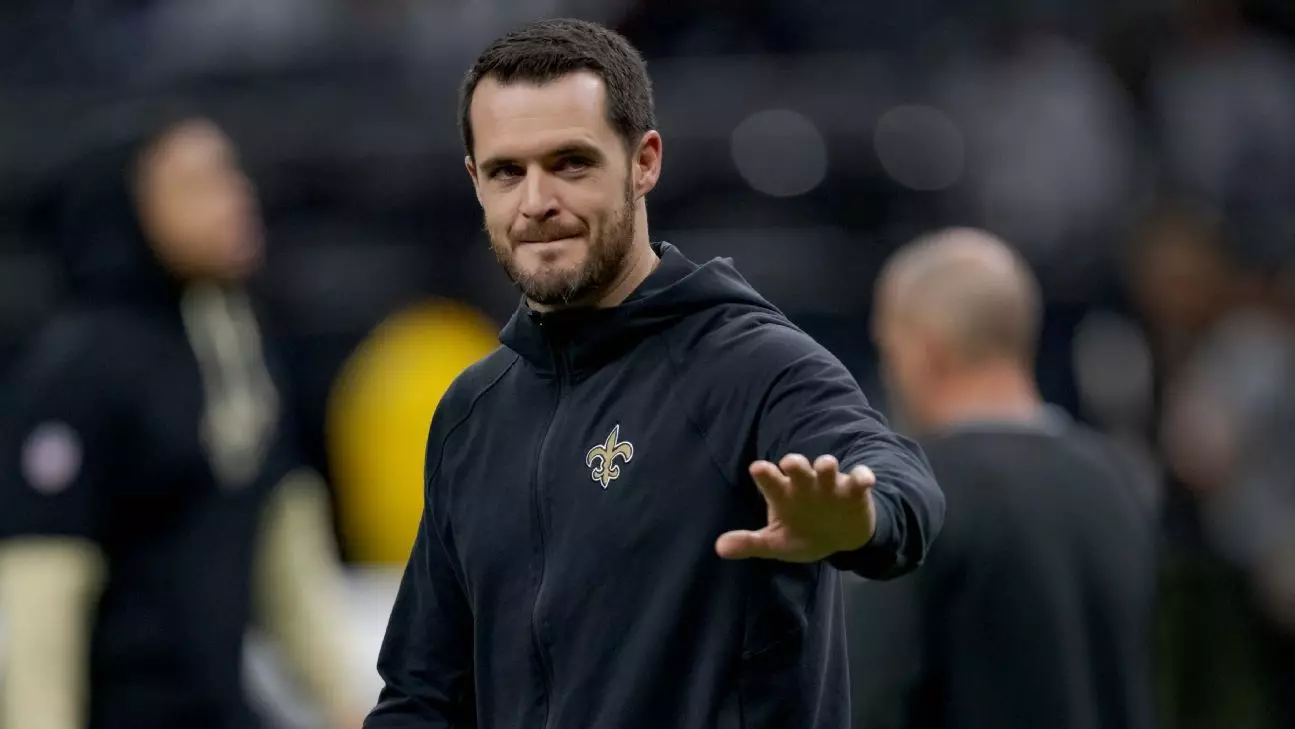The New Orleans Saints have confirmed that quarterback Derek Carr will miss the remainder of the season following an injury occurring in a game against the New York Giants. This decision follows weeks of speculation and hope surrounding Carr’s recovery after he fractured his non-throwing hand. Interim coach Darren Rizzi’s optimistic remarks contrasted sharply with the reality of Carr’s situation, raising questions about injury management and the implications for the Saints moving forward.
In the wake of Carr’s injury, Coach Rizzi remained publicly hopeful, consistently suggesting that the door was still open for Carr’s return. Rizzi’s comments illustrated a belief in Carr’s commitment to recovery and a desire to see him back on the field as soon as possible. Rizzi expressed frustration over the portrayal of Carr’s injury status, emphasizing the quarterback’s diligent rehabilitation efforts. This optimistic stance, however, appears to stem more from a coach’s desire to instill hope and resilience within the team than from a realistic assessment of Carr’s condition. The dissonance between the coach’s affirmations and the eventual outcome reveals the complexities of injury narratives in professional sports, where public expectations can clash with medical realities.
Despite Rizzi’s insistence that Carr was progressing, it became increasingly clear that the quarterback’s injury had significantly hindered his ability to perform. The attempts to simulate game scenarios for Carr showed that he lacked the necessary functionality to execute plays effectively. Pain management injections were trialed, yet they did not yield the expected outcomes. This makes one question the strategy adopted by the team’s medical staff: was there a misjudgment in assessing Carr’s readiness to play, or was this diligence in heed of a player’s wishes to return too optimistic? In professional football, especially in high-stakes environments, a player’s ability to perform under pressure without optimal physical capability poses significant risks, not only to the individual’s health but also to the team’s performance.
With Carr sidelined indefinitely, the ripple effects on the Saints’ roster become evident. Running back Alvin Kamara has faced his own injury challenges, missing multiple games due to a groin issue and is currently listed as doubtful. The uncertainty surrounding Kamara’s availability compounds the team’s struggles. Additionally, wide receiver Chris Olave’s status, having sustained concussions throughout the season, adds another layer of ambiguity to the team’s offensive capabilities. Collectively, these injuries create a scenario where the Saints are likely facing an uphill battle to maintain competitive performance during the final stretch of the season.
The implications of these injuries extend beyond the immediate roster dynamics. Carr’s absence might prompt reflection on the team’s long-term strategy concerning their quarterback position. His tenure with the Saints was already a transition phase, and the necessity of identifying an alternative path forward could be a critical conversation point for management in the off-season.
As the Saints approach the final games of the season without their starting quarterback, it becomes essential for the coaching staff and players to focus on a rebuilding mindset. The injury to Carr offers an opportunity to assess the depth of the squad, utilizing backup players and providing them with essential game time, which is invaluable for future development.
Moreover, evaluating the medical and coaching protocols surrounding player injuries will be crucial in shaping future strategies. The delicate balance between ambition to win games and the responsibility to protect player health must guide decision-making processes going forward.
While Carr’s injury is a significant setback for the New Orleans Saints, it serves as a critical juncture for introspection and strategic realignment within the organization. The coming weeks will be telling, as the team must adapt to its circumstances, all while keeping an eye toward the future.


Leave a Reply